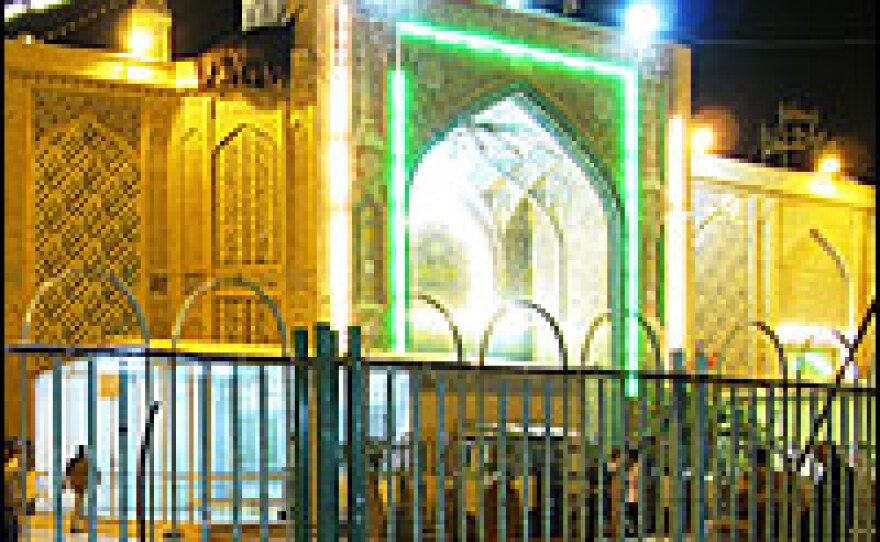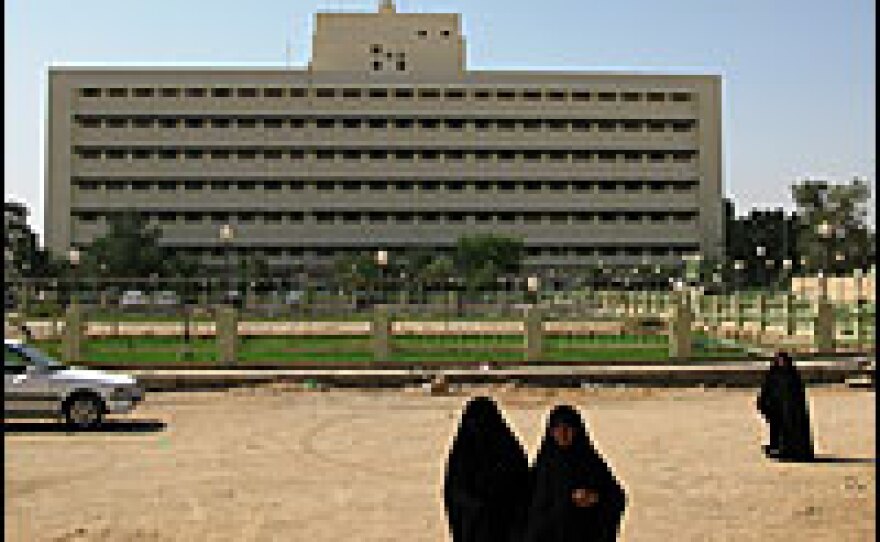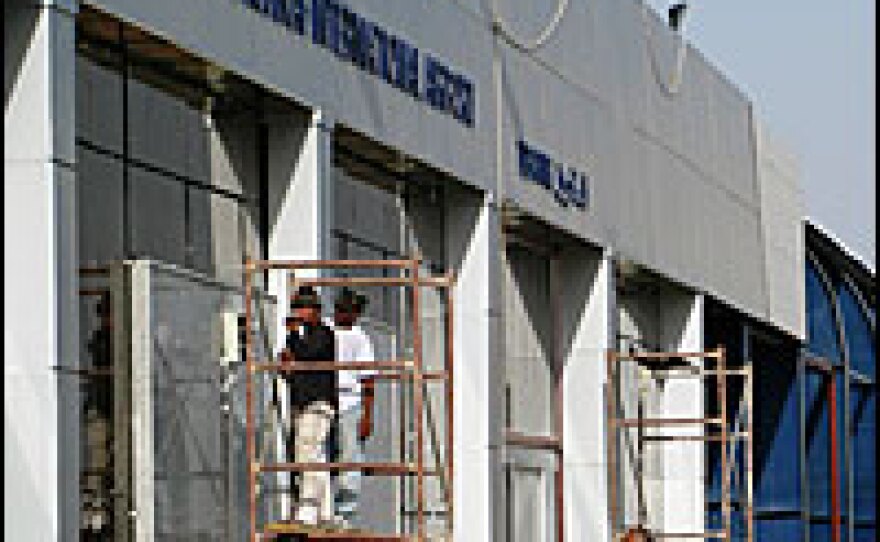


The southern Iraqi city of Najaf is the center of the Shiite Muslim faith — the sect's equivalent of the Vatican.
About a million pilgrims from Iraq and abroad go to Najaf every year to worship in its gold-domed shrine or to bury their dead in the world's largest Muslim cemetery.
The Shiite sect's key clerics and ayatollahs also train at seminaries in Najaf, and they issue decrees obeyed by millions of people worldwide.
But a number of Iraq's political power brokers believe Najaf should be more than a religious epicenter, and they have quietly begun expanding the city in hopes of turning it into a capital of the south.
It's an expansion some fear could hasten a partition of Iraq.
A Changing Face In Najaf
Last month, an Iraqi Airways jet carrying the country's prime minister landed in Najaf to inaugurate the city's new airport. A band played while Najaf residents waved and shouted greetings.
It was a rare celebration of the changing face of Najaf — a change that is evident all over the city, but little known elsewhere in Iraq.
Officials here say the race is on to finish work on the airport before scheduled service begins later this month.
Officials say that by next year, this airport should accommodate up to 3 million domestic and international passengers.
That number could eventually climb to 13 million passengers, says airport director Kareem al-Abdaly. That would make Najaf International Airport the largest in Iraq.
"Let's face it," Abdaly says. "Najaf is now more important than Baghdad. There, everything deteriorated because of the violence. Here, we have stability."
A Stable City
There's no doubt things have been more stable in this city in the past three years than anywhere else in Iraq except for the Kurdish north.
Iraqi police keep a tight watch over who comes and goes, making it safe for residents and visitors to walk the streets at all hours of the day and night.
Also key is that radical Shiite cleric Muqtada al-Sadr has stuck to a cease-fire he imposed on his Mahdi Army militia last year.
The quiet has left the city government, run by Sadr's opponents, free to pursue plans to make Najaf the capital of the south.
Plans like those in the field of medicine, where, in a clinic in Sadr Hospital that claims to be the best in Iraq, technicians use saws and hammers to fashion prosthetic limbs.
The clinic is part of a sprawling, single-story complex of specialty care growing up around Sadr Hospital, the main medical facility in Najaf. It is named for a grand ayatollah assassinated during Saddam Hussein's reign.
Abdul A'al is deputy director of the hospital.
"All of this is being done by an Iraqi company and another one from the United Arab Emirates," says A'al. "This year we've opened a clinic for heart catheterization, and today we started work on a center for neurological sciences."
As with the airport, A'al says the goal is to make this medical complex in Najaf better than any other in Iraq.
Already word is out about the kind of treatment available here, and patients are pouring in. A'al says the entire medical complex should be completed by the end of next year.
Giving Najaf A Chance To Shine
He and airport director Abdaly say they couldn't be happier about Najaf's transformation.
Abdaly says that under Saddam, Shiites were oppressed and Najaf was falling apart. Now, he says, the city has a chance to shine. He adds: "Why not let residents build like crazy here with a Shiite-led government in charge in Baghdad?"
This is a sentiment Abdul Hussain Abtan shares. The deputy governor of Najaf is determined to see his city's reputation extend beyond Iraq's borders.
Abtan oversees the reconstruction effort in the city. He says so far, $1.5 billion has been spent on improving Najaf.
He's especially excited about an industrial zone planned for the western edge of the town. He says the seven-square-mile complex will be the largest industrial zone in Iraq.
Abtan says the city government is also planning a new, $38 billion suburb to accommodate Najaf's growing population.
"Najaf is now No. 1 in Iraq in terms of reconstruction projects and economic power," Abtan says. "It'll take another decade for us to be No. 1 in the Middle East."
Skepticism About The Expansion
Some people here are skeptical of that prediction, despite the ever present cranes and scaffolding and construction on new buildings and streets.
But whatever the Najaf government's ambitions, there are many residents who are unhappy about what is happening to their city these days.
Those for and against the expansion are pretty much divided along political lines. Those in charge, like Abtan, belong to what is known as the Supreme Council, the most powerful Shiite party in the country at the moment.
Opponents like Liqaa al-Yasseen, a medical doctor and parliament member, belong to Sadr's bloc. Sadr's supporters have been relegated to the sidelines, but they are hoping to gain more power through planned provincial elections expected next year.
But Yasseen, a Najaf native, says she's not concerned about politics. She wants to know why the ordinary citizens of Najaf are not benefiting more from the construction.
"The electricity is still bad and we only have it for two hours after six hours of blackouts," Yassen says. "The drinking water is a problem, too. Some neighborhoods in Najaf get no water and others get contaminated water."
But what is most worrisome, Yasseen says, is how the efforts to develop Najaf could contribute to a potential splitting up of Iraq.
Too Soon For Regional Capitals
While she supports a more decentralized Iraq where local and regional governments wield more power, Yasseen says it's too soon to be creating separate regional capitals, like the Kurds have in the north.
She says a central government and strong ministries are still needed to make sure Iraq can stand on its own feet, and she questions whether officials in Najaf have enough experience to execute multimillion-dollar projects like the proposed industrial zone.
Sheik Salah al Obaidi, Sadr's spokesman, agrees. He complains that construction contracts are going to companies that are linked to those in charge. He also worries that all of the attention being paid to Najaf will foster resentment among residents of other cities, even Shiite ones.
"We look for development for Najaf, but at the same, development for Diwaniyah, for Samawa, for Hilla," Obaidi says. "We have not to forget other governments in the same style Saddam has done. He has concentrated all his efforts on Baghdad, Tikrit and Mosul, for example, so we ought not to make the same mistake."
Nevertheless, many Najaf residents feel that development in their city has run amok. Some point to a new shrine for Ayatollah Mohammed Baqir al Hakim, the former head of the ruling Supreme Council until he was killed in a bombing five years ago, which is drawing criticism.
For as respected as Hakim may be, may people say they resent his shrine and the adjacent political offices, as they will very likely be larger than Najaf's main shrine just one mile away. That shrine holds the remains of Imam Ali, the man Shiites revere as Islam's Prophet Muhammad's successor.
Copyright 2022 NPR. To see more, visit https://www.npr.org. 9(MDAzMjM2NDYzMDEyMzc1Njk5NjAxNzY3OQ001))







